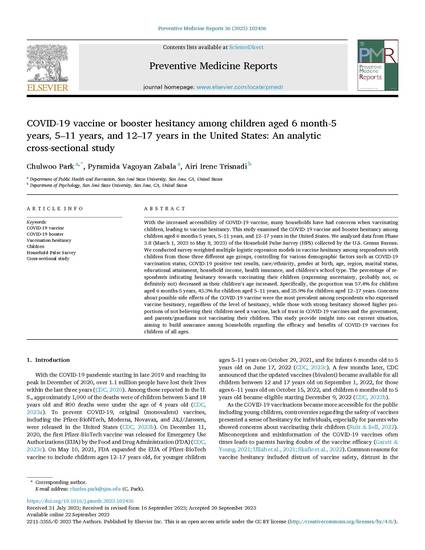
With the increased accessibility of COVID-19 vaccine, many households have had concerns when vaccinating children, leading to vaccine hesitancy. This study examined the COVID-19 vaccine and booster hesitancy among children aged 6 months-5 years, 5–11 years, and 12–17 years in the United States. We analyzed data from Phase 3.8 (March 1, 2023 to May 8, 2023) of the Household Pulse Survey (HPS) collected by the U.S. Census Bureau. We conducted survey-weighted multiple logistic regression models in vaccine hesitancy among respondents with children from those three different age groups, controlling for various demographic factors such as COVID-19 vaccination status, COVID-19 positive test results, race/ethnicity, gender at birth, age, region, marital status, educational attainment, household income, health insurance, and children’s school type. The percentage of respondents indicating hesitancy towards vaccinating their children (expressing uncertainty, probably not, or definitely not) decreased as their children's age increased. Specifically, the proportion was 57.4% for children aged 6 months-5 years, 43.3% for children aged 5–11 years, and 25.9% for children aged 12–17 years. Concerns about possible side effects of the COVID-19 vaccine were the most prevalent among respondents who expressed vaccine hesitancy, regardless of the level of hesitancy, while those with strong hesitancy showed higher proportions of not believing their children need a vaccine, lack of trust in COVID-19 vaccines and the government, and parents/guardians not vaccinating their children. This study provide insight into our current situation, aiming to build assurance among households regarding the efficacy and benefits of COVID-19 vaccines for children of all ages.
- COVID-19 vaccine,
- COVID-19 booster,
- Vaccination hesitancy,
- Children,
- Household Pulse Survey,
- Cross-sectional study
Available at: http://works.bepress.com/chulwoo-charles-park/50/
